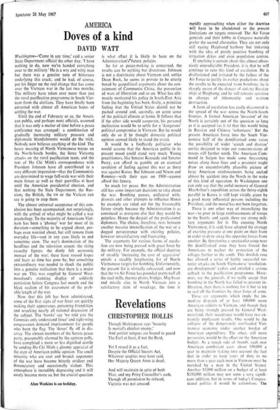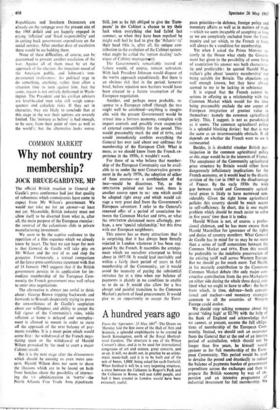Doves of a kind
AMERICA DAVID WATT
Washington—'Come in any time,' said a senior State Department official the other day; 'I have nothing to do, now we've handed everything over to the military.' He is a wry and witty man but there was a genuine note of bitterness underlying this crack; and he had, of course, put his finger on the real change that has come over the Vietnam war in the last two months. The military have taken over more than just the rural pacification programme in South Viet- nam from the civilians. They have finally been entrusted with almost all American hopes of settling the war.
Until the end of February or so, the Ameri- can public, and perhaps most officials, assumed that it was only a matter of time before a peace conference was arranged: a combination of gradually increasing military pressure and diplomatic blandishments would do the trick. Nobody now believes anything of the kind. The heavy massing of North Vietnamese troops on the North-South border, the fierce Vietcong attacks on the rural pacification team, and the text of Ho Chi Minh's correspondence with President Johnson have all contributed to a very different impression—that the Communists are determined to wage full-scale war with their main forces as well as their guerrillas at least until the American presidential election, and that nothing the State Department, the Rus- sians, the British, the UN or the Vatican can say is going to stop them.
The almost universal acceptance of this con- clusion has been accompanied, not surprisingly, with the arrival of what might be called a war psychology. To the majority of Americans Viet- nam has been a 'phoney' war for most of its duration—something to be argued about, per- haps even worried about, but still remote from everyday life—and in any case likely to end sometime soon. The war's domination of the headlines and the television screen; the rising casualty figures; the dimly felt economic menace of the war; these have roused hopes and fears as time has gone by, but something extraordinary was needed to shock the public into a genuine realisation that there is a major war on. This was supplied by General West- moreland's stunning display of soldierly patriotism before Congress last month and the bleak realism of his assessment of the prob- able length of the war.
Now that this jolt has been administered, some of the first signs of war fever are quickly making their appearance, poisoning friendships and wrecking nearly all rational discussion of the subject. The 'hawks' say 'we told you the Commies only understand force' and right-wing congressmen demand imprisonment for people who burn the flag. The 'doves' fly off in dis- array. The sixteen members of the Senate peace party, presumably alarmed by the opinion polls, have completed a more or less dignified scuttle by sending Ho Chi Minh a gloomy appraisal of the state of American public opinion. The small minority who are root and branch opponents of the war have become bitterly strident and denunciatory and occasionally violent. This atmosphere is incredibly depressing and it will surely become more so, but the crucial question Alan Watkins is on holiday.
is what effect it is likely to have on the Administration's.future policies.
So far as peace-making is concerned, the results can be nothing but disastrous. Johnson is not a doctrinaire about Vietnam and, unlike Dean Rusk, he seems in private to be utterly bored by geopolitical arguments about the con- tainment of Communist China, the prevention of wars of liberation and so on. What has ulti- mately motivated his policy in South-East Asia from•the beginning has been, firstly, a primitive feeling that the United States should not be pushed around and, secondly, an acute sense of the political climate at home. It follows that if the other side would cooperate, his personal inclination would be to settle for a 'dangerous' political compromise in Vietnam. But he would only do so if he thought domestic political opinion seemed likely to stand the strain.
It would be a foolhardy politician who would assume that the American public in its present mood could stand very much. Young practitioners, like Senator Kennedy and Senator Percy, can afford to gamble on an eventual revulsion of feeling against this war as there was against Korea. But Johnson and Nixon and Romney—with their eyes on 1968—cannot afford this luxury.
So much for peace. But the Administration still has some important decisions to take about the war. Bombing pauses, unilateral with- drawals and other attempts to influence Hanoi by example are ruled out for the foreseeable future simply because the Administration is as convinced as everyone else that they would be pointless. Hence the despair of the professional diplomats. The choice, therefore, rests between another massive intensification of the war or a dogged perseverance with existing policies, however unsatisfactory and frustrating.
The arguments for various forms of escala- tion are now being pressed with great force by the military. For example, the official doctrine of steadily 'increasing the cost of aggression' entails a steadily lengthening list of North Vietnamese targets for bombing. Unfortunately, the present list is virtually exhausted; and now that the us Air Force has pounded pretty well all the steel mills, thermo plants, bridges, Mig bases and missile sites in North Vietnam into a satisfactory state of wreckage, the time is rapidly approaching when either the doctrine will have to be abandoned or the present limitations on targets removed. The Air Force generals and their lobby in Congress naturally prefer the second alternative. They are not only still eyeing Haiphont harbour but tinkering with the idea of purely punitive bombing of irrigation dykes and even population centres. If anything is certain about this almost obses- sively unpredictable President, it is that he will continue to veto this kind of escalation. He is disillusioned and irritated by the failure of the Air Force to justify its earlier predictions about
the results to be expected from bombing; he is sharply aware of the danger of sinking Russian ships at Haiphong, and he still remains sensitive to charges of inhumanity and wanton destruction.
A form of escalation less easily discounted is the spread of the war across the North-South frontier. A formal American 'invasion' of the North is certainly out of the question so long as it is accepted (as it is) that this would bring in Russian and Chinese 'volunteers.' But the present American foray into the South Viet- namese half of the demilitarised zone raises the possibility of wider 'search and destroy'
sorties designed to wipe out concentrations of troops still further north. The American Com- mand in Saigon has made some threatening noises along these lines and a pessimist might draw an uncomfortably plausible picture of large American reinforcements being sucked almost by accident into the North in the wake of this kind of operation. In Washington one can only say that the awful memory of General MacArthur's expedition across the thirty-eighth parallel in Korea is still kept vividly green by a good many influential persons including the President, and the moral has not been forgotten.
There is one other way of intensifying the war—to pour in large reinforcements of troops to the South; and again, there are strong mili- tary arguments for it. The cunning North Vietnamese, it is said, have adopted the strategy of exerting pressure at one point on their front in order to draw away the opposing forces from another. By threatening a spectacular coup near the demilitarised zone they have forced the Americans to neglect the protection of the villages farther to the south. This devilish ruse has allowed a series of highly successful ter- rorist attacks on South Vietnamese 'revolution- ary development' cadres and entailed a serious setback to the pacification programme. More- over, say the generals, if we really accept that bombing in the North has failed to prevent in- filtration, then there is nothing for it but to try to seal off the frontiers by sheer force of arms.
These are arguments which imply the im- mediate dispatch of at least 100,000 more American soldiers to Vietnam, and though they arc being strongly pressed by General West- moreland, their acceptance would have two ex- tremely unpleasant results. One would be the collapse of the dangerously overloaded Viet- namese economy under another burden of American expenditure. The other, still more persuasive, would be the effect on the American budget. As a rough rule of thumb, each new American combatant costs about $50,000 a year to maintain (taking into account the fact that in order to keep tours of duty to no more than a year each man in Vietnam must be matched by a man in the United States). Another $5,000 million on a budget of at least $135,000 million may not seem a very signifi- cant addition, but in terms of today's Congres- sional politics it would be calamitous. The Republicans and Southern Democrats are already on the rampage over the present size of the 1968 deficit and are happily engaged in crying 'inflation' and `fiscal responsibility' and in cutting back government expenditure on the social services. After another dose of escalation there would be no holding them.
None of these difficulties, of course, can be guaranteed to prevent another escalation of the war. Against all of them must be set the approach of the election, the impatient mood of the American public, and Johnson's tem- peramental restlessness: his political urge to do something, anything, rather than allow a situation time to turn against him. Just the same, reason is not entirely dethroned in Wash- ington. The President and his civilian advisers are level-headed men who still weigh conse- quences and calculate risks. If they act in character, they are likely to conclude that at this stage in the war their options are severely limited. The `mixture as before' is bad enough, to be sure, from their point of view as well as the world's; but the alternative looks worse.



































 Previous page
Previous page